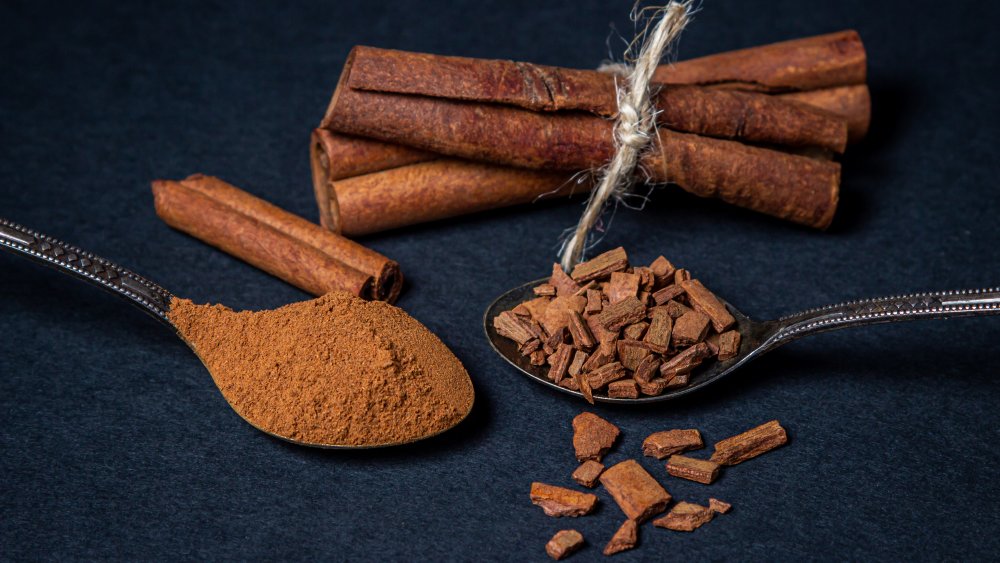You Should Eat Cinnamon Every Day. Here's Why
Cinnamon is fragrant, spicy, and distinctive in its smell and taste. It's used in baked goods, beverages, and a host of dishes that are consumed on a daily basis. Seriously, cinnamon rolls, apple pie, and cinnamon sugar toast would not be the same without the sweet and mild tang cinnamon adds to their deliciousness. Even celebrity chef Emeril Lagasse has been quoted as touting the spice's goodness: "I can't tell you enough about cinnamon. Cinnamon is an awesome spice to use" (via Brainy Quote). If so, Lagasse's not alone – there's a long history of people who have recognized the important role cinnamon can play in a culinary arsenal. It's a clear unicorn spice with health benefits and healing properties whose use can be traced all the way back to the Bible.
It is believed that in the Middle Ages, this spice was used for alleviating coughing fits, relieving arthritis pain, and soothing sore throats. Fast-forward to the present day and cinnamon is considered to be one of the most popular spices in the United States, second only to black pepper (via Medical News Today). While cinnamon continues to add its fragrance to our favorite meals and desserts, it is also believed to have properties that are beneficial to our health – so much so, you might want to find a way to incorporate its awesomeness into your daily diet.
Cinnamon might aid in fighting type 2 diabetes
Cinnamon comes from a tropical evergreen, per a CNN Health, but different varieties of cinnamon have different uses and health benefits. People in the U.S. tend to use Cassia cinnamon, which hails from China and Indonesia. We lean towards this type of cinnamon for the simple fact that it is cheaper than the other major variety, Ceylon cinnamon, which is produced in Sri Lanka. But Ceylon is lower in a substance called coumarin. Coumarin may cause liver damage, and therefore Ceylon is considered the better of the two varieties if you want to reap the potential health benefits associated with cinnamon (via Cinnamon Vogue). What are these benefits?
Research is ongoing, but cinnamon might be beneficial in the fight against type 2 diabetes. Lauri Wright, a spokeswoman for the Academy of Nutrition and Dietetics, told the outlet, "I think the strongest evidence lies so far with diabetes and the promise of cinnamon and blood sugar control." A study that focused on people with type 2 diabetes concluded that small amounts of cinnamon lowered both bad cholesterol and blood sugar levels. It's important to note that there's no official recommended daily intake for medicinal use (via WebMD). Some sources suggest using no more than one half to one teaspoon. In high amounts, cinnamon can be toxic.
Try a self-test with cinnamon
Still, others suggest that more research is needed and to proceed with caution in using cinnamon to control your blood sugar. According to registered dietitian Melinda Maryniuk of the American Diabetes Association, a 2013 meta-analysis – which is a thorough review of many different studies and statistics – concluded cinnamon didn't affect levels of the established biological marker for blood sugar.
But Marynuik also told CNN the best way to determine if cinnamon works to control your blood sugar is to do a self-test. Her instructions: "Do some paired blood glucose testing. Use a half a teaspoon in the morning, on fruit or oatmeal or in coffee, and see what happens to your blood sugar levels before and after you eat. Check again two to three hours later and see if there's a difference." She also cautions that you should talk to your doctor if you want to test the effects of cinnamon on your blood sugar.
Cinnamon's other possible benefits
Cinnamon may have health benefits when it comes to fighting Alzheimer's and Parkinson's (via Healthline). These diseases ravage the brain, killing off cells related to memory, movement, and so much more. Cinnamon apparently contains inhibitors that ward off a telltale sign of Alzheimer's. These inhibitors prevent a protein called tau from accumulating in the brain. Moreover, a study involving mice showed that cinnamon aided in safeguarding brain cells and positively influenced motor function. While that outcome sounds like a promising step in the fight against Parkinson's, but it's unclear if that finding is applicable to humans. More research is needed.
There is also some buzz around using cinnamon on a daily basis to help aid in weight control. We all hope for a miracle substance to help keep off the pounds that tend to creep up so fast we can't pinpoint why our jeans won't zip up, and cinnamon may provide that added boost to our diets. According to Medical News Today, cinnamon contains a healthy dose of fiber. Clocking in at 1.6 grams, cinnamon can help make you feel full; however, cinnamon by itself is not going to keep you slender. Rather, it should be used in concert with a healthy diet and exercise.



